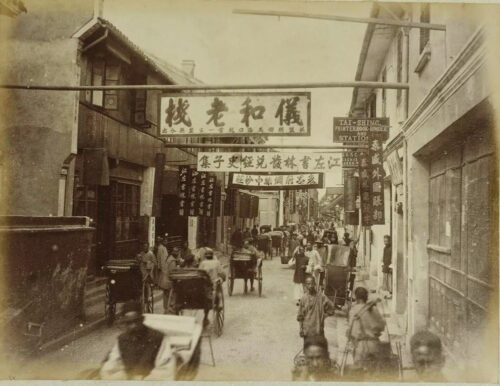Remembering Shanghai Pride, China’s largest LGBTQ festival
This month would have marked the 14th Shanghai Pride event, an annual festival first held in 2009 — if not for the fact that it has been on indefinite hiatus for the last two years.

Before organizers announced its suspension in mid-August 2021, Shanghai Pride was one of the largest and longest-running pride festivals in Greater China, behind only the Pride Parades in Hong Kong and Taipei. The most recent edition, held in 2020, featured events spanning three months. It started with an outdoor “rainbow bike ride” on May 17 (as a way to observe the International Day Against Homophobia, Biphobia and Transphobia [IDAHBT]), then featured a series of activities in June, including job fairs, a pride run, parties, film screenings, and LGBTQ-themed talks and public forums, before ending with a month-long LGBTQ art exhibition.
Despite COVID-19, events saw around 5,000 visits, according to Raymond Phang, an organizer. The year before COVID, that number was double. Considering the shrinking environment in China for minorities of any kind — sexual or otherwise — to let themselves be heard, Shanghai Pride’s very existence felt like a reason for celebration.
“We didn’t mean to resist anything, but just wanted to show people who we are,” Charlene, a co-founder, said in a 2018 interview. Her founding group, consisting of queer expats, initiated the festival in 2009 as a way to organize bite-sized art and entertainment activities during Pride Month.
For the first few years, the working language was primarily English. Phang recalled how he first found out about the event in 2010 when he moved from Malaysia to Shanghai to attend university. “I searched Shanghai gay events on Google — the website could still be accessed in China back then — and Shanghai Pride popped up after the names of a few gay bars.”
As his own birthday is in June, Phang has many fond memories of celebrating with his friends at Pride events. One of his best memories was when he hosted the closing party of Shanghai Pride, standing in front of thousands of people and listening to them sing “happy birthday” to him.
Phang began as a volunteer before moving his way up to leading organizer. He oversaw the expansion of the festival, especially after 2015, when the events grew in size and themes became more diversified. The volunteer team also became increasingly Chinese. This meant more logistical work for a team that fully depended on volunteers: finding venues, seeking sponsorships, cultivating relationships with both the government and foreign consulates. Phang recalled the preparation often started a half-year in advance.
Organizers also needed to understand the hidden and ambiguous rules under a constantly shifting political environment. Censorship and restrictions on public events were obstacles from the very beginning. In an interview with CNN, Charlene mentioned how the team always prepared plans B and C when organizing events, since it was common for authorities to pressure venues to cancel.
This sensitive environment meant there was always a ceiling on Shanghai Pride’s growth. Phang recalled one time nixing an idea to wrap an entire building in rainbow colors, believing the act “might attract too much attention.”
“Our volunteers often develop imaginative ideas, but sometimes we may need to slow down our pace in China,” Phang said.
Most of Shanghai Pride’s events were indoor, distinguishing it from pride events in places such as Hong Kong and Taipei, which normally culminate in a street parade. As one organizer explained in an interview, the outdoor “Pride Run” was an exploration of possible methods in raising LGBTQ public visibility, since it was impossible to have a parade. However, even this “sporting” event was quickly noticed by the government, with organizers being asked to explain the purpose of the activity.
The restrictions and pressures have only escalated in recent years. In 2020, Shanghai Pride announced an indefinite hiatus, without providing much explanation. The notice sparked speculations about the real cause. One year later, in an open letter, Phang wrote, “Pride has grown to a scale that was probably too visible, likely making an impact, and thus catching too much (unwanted) attention.”
He told The China Project, “I have to clarify that we were not requested (by officials) to suspend the Pride. It was our own decision. It was in 2020 that the attention paid to us increased so much that it impacted the personal lives of our organizers. Due to the restrictions of the pandemic, and us being labeled as ‘foreign forces’ (境外势力 jìngwài shìlì), we felt really exhausted and wanted to take a rest.”
Ah Qiang, the former director of Trueself (出色伙伴 chūsè huǒbàn), another major LGBTQ organization based in Guangzhou, remarked that starting around 2019, LGBTQ events could still be held in June, but that on social media has been increased censorship of terms such as “Pride Month” (骄傲月 jiāo ào yuè) and “May 17” (i.e., IDAHBT). Activists and organizers began avoiding these terms even while celebrating Pride Month. “The terms will cause trouble if you use them, as they are considered related to ‘ideological issues’ (意识形态问题 yìshí xíngtài wèntí),” Ah said.
Phang said volunteers who used to work for Shanghai Pride are still running events, although no longer under the same name. Many of these events are listed on Shanghai Pride’s website. “It feels like we’re back in 2010 or 2011, when we could only disclose the exact venue a few days before the event (out of safety concerns),” Phang said. Despite all the setbacks, he still believes many things can still be done, both now and in the future.
“It takes time to recover, I guess.”

Other LGBTQ stories:
Chinese director wins a Cannes Queer Palm award
Chinese director Huáng Shùlì’s 黄树立 film Will You Look at Me, featuring a conversation between the filmmaker and his mother over questions of love and acceptance, won the 2022 Queer Palm for best short film. The Queer Palm is a prize given to LGBTQ films entered in the Cannes Film Festival.
Legal advocate gives a talk on LGBTQ rights
LGBTQ rights advocacy lawyer Liú Míngkē 刘明珂 delivered a public talk on the TED-like platform Yīxí 一席 on discrmination against transgender and gay people in China. Liu introduced a few legal cases in the past years involving same-sex marriage rights, workplace discrmination, and revising of gender marks on educational diplomas for trans people. The recap of the talk has more than 60,000 views as of this writing.
Hong Kong-based professor discusses LGBTQ issues in Hong Kong and China (Bloomberg)
Suen Yiu Tung, an assistant professor at the Chinese University of Hong Kong, discussed the current situation faced by LGBTQ people in Hong Kong and China and what corporations can do to improve their rights in the challenging political environment.
Chinese diplomat shows oblique support of LGBTQ rights?
When the deputy director of the Chinese Ministry of Foreign Affairs posted a rainbow on his Weibo. People just make it more RAINBOW🌈 the top 20 comments with thousands of likes are all about #HappyPrideMonth #loveislove we support the government celebrates pride with us😄😄 pic.twitter.com/2jjazJGBgL
— Yanziii (@YanziPeng) June 3, 2022
Zhào Lìjiān 赵立坚, a Chinese politician and diplomat, posted a photo of a rainbow on his Weibo. Some of the top comments interpret it as a sign of support for LGBTQ people. Under increasing censorship on the Chinese internet, the term “rainbow” (彩虹 cǎihóng) and its associated emoji 🌈 are used by LGBTQ people to forge a community. Zhao is widely considered an aggressive diplomat, so his post could end up meaning nothing at all.
Queer China is our fortnightly round-up of news and stories related to China’s sexual and gender minority population.





